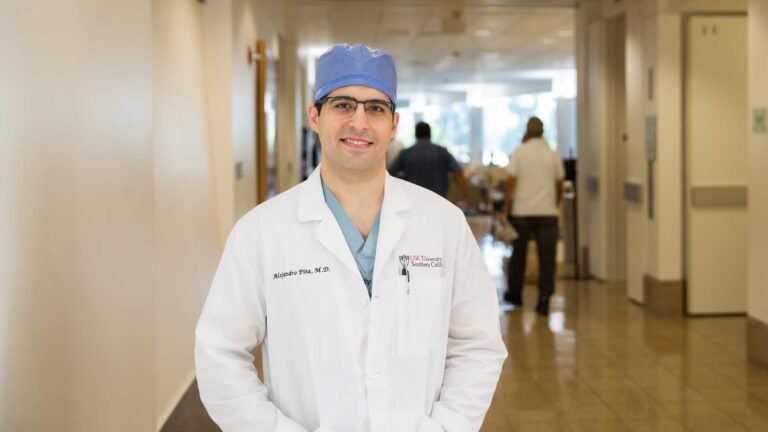
Alejandro Pita watched his father perform surgeries in Cuba, and is now a general surgery resident at USC. (Photo/Ricardo Carrasco III)
As a kid in Cuba, he watched his dad perform surgery — now he’s a resident at USC
Alejandro Pita settles into the Keck School of Medicine, where camaraderie and community support counts
As a surgeon with a strong sense of how important personal connections can be, Alejandro Pita knew that he had found his first choice when he arrived at USC for his residency interview. He attended a pre-interview dinner with Kenji Inaba, associate professor of surgery (clinical scholar) at the Keck School of Medicine of USC and the program director for surgical residency.
The encouragement of camaraderie among the residents, as well as close relationships between residents and faculty, made Pita realize he had found his new home.
“Dr. Inaba is so accomplished but so caring at the same time,” Pita said.
Pita, a resident in the Division of Hepatobiliary, Pancreas and Abdominal Organ Transplant, was born and raised in Cuba. His father, an orthopaedic surgeon, let young Alejandro watch surgeries at the age of 6. Two years later, his father migrated to the United States, working for a decade as a nurse until he could petition to bring Pita over. Four years after that, Pita was able to petition to bring his mother here and reunite the family at last.
His early experiences left him with an appreciation for community support and encouragement, which he found at USC.
“It’s really a family,” Pita said. “And that’s not true everywhere.”
Helping healers
One of the reasons the Keck School of Medicine has been able to attract and keep more than 1,000 high-caliber fellows and residents like Pita is the attention paid to graduate and medical student well-being.
Our graduates end up not only as excellent physicians, but as leaders in their community.
Lawrence Opas
“Our innovative residency wellness initiatives are being integrated into each of our programs,” said Lawrence M. Opas, senior associate dean for graduate medical education and professor of clinical pediatrics at the Keck School. In addition to a “big sibs” program in which senior residents are assigned new residents to check in with, there is a Helping Healers Heal program in which trained nurses, faculty and residents are available 24 hours a day to help caregivers deal with emotional challenges that may result from medical errors or the death of a patient.
The school also has created a new director of residency wellness position, thanks to a grant from the UniHealth Foundation. P. Tobi Fishel, clinical associate professor of pediatrics, is tasked with everything from implementing program-wide measures to prevent and relieve burnout to one-on-one counseling.
“Our graduates end up not only as excellent physicians, but as leaders in their community,” Opas said. “We take the responsibility of keeping them emotionally healthy very seriously.”
